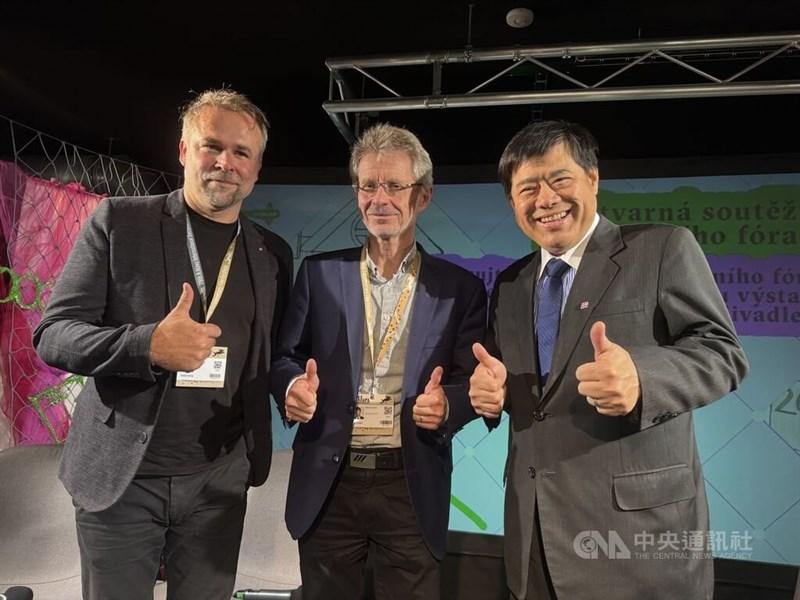A documentary about a controversial visit to Taiwan in 2020 by Miloš Vystrčil, president of the Czech Senate, premiered in Prague yesterday.
The documentary, titled Jsem Tchajwanec (I am Taiwanese), highlights Vystrčil's strong pushback against pressure from China and his own government when he was about to embark on the visit from Aug. 30 to Sept. 4, 2020.
The film "evokes memories of a journey that remains deeply meaningful," Vystrčil said at the premiere at the annual Ji.hlava International Documentary Film Festival in Prague.

Photo: CNA
Vystrčil said he was pleased to see that the Taiwan-Czech partnership remained enduring, and he expressed his continued support for the Taiwanese people, saying: "I am rooting for you."
At a post-screening panel discussion, he said that the 1989 Velvet Revolution and the subsequent fall of communism in Czechoslovakia were a powerful reminder that "freedom is hard-won and must be cherished."
"Once we have gained freedom, we must never again give it up by abandoning what is right, out of fear or threat," Vystrčil said, adding that his decision to visit Taiwan in 2020 was guided by that conviction.
In an interview with CNA last year, Vystrčil said he had been warned by the Czech Ministry of Foreign Affairs and Chinese diplomats there not to proceed with his plans to visit Taiwan, after he took office as president of the Czech Republic Senate in February 2020.
However, Vystrčil went ahead with the visit, becoming the first head of parliament from a non-allied country to address Taiwan's legislature.
At the end of his speech in the Legislative Yuan, he declared "I am Taiwanese" in Mandarin.
His statement was in the spirit of former US president John F Kennedy's famous declaration in German, "I am a Berliner," which he made during a speech in West Berlin in 1963.
Kennedy was expressing solidarity with the people of West Berlin, who were living in a democratic enclave surrounded by communist East Germany during the Cold War.

A strong continental cold air mass is to bring pollutants to Taiwan from tomorrow, the Ministry of Environment said today, as it issued an “orange” air quality alert for most of the country. All of Taiwan except for Hualien and Taitung counties is to be under an “orange” air quality alert tomorrow, indicating air quality that is unhealthy for sensitive groups. In China, areas from Shandong to Shanghai have been enveloped in haze since Saturday, the ministry said in a news release. Yesterday, hourly concentrations of PM2.5 in these areas ranged from 65 to 160 micrograms per cubic meter (mg/m³), and pollutants were

Taiwan’s armed forces have established response protocols for a wide range of sudden contingencies, including the “Wan Chun Plan” to protect the head of state, the Ministry of Defense (MND) said today. After US President Donald Trump on Saturday launched a series of airstrikes in Venezuela and kidnapped Venezuelan President Nicolas Maduro, concerns have been raised as to whether China would launch a similar “decapitation strike” on Taiwan. The armed forces regularly coordinate with relevant agencies and practice drills to ensure preparedness for a wide range of scenarios, Vice Minister of National Defense Hsu Szu-chien (徐斯儉) told reporters before a

EVA Airways on Saturday said that it had suspended a pilot and opened an investigation after he allegedly lost his temper and punched the first officer several times as their plane was taxiing before takeoff at Los Angeles International Airport. According to a report published on Thursday by The Reporter, the incident occurred after the flight’s Malaysian first officer tried to warn the Taiwanese pilot, surnamed Wen (文), that he was taxiing faster than the speed limit of 30 knots (55.6kph). After alerting the pilot several times without response, the first officer manually applied the brakes in accordance with standard operating

NOT AN OPENING: Trump’s violation of international law does not affect China’s consideration in attacking Taiwan; Beijing lacks capability, not precedent, an official said Taiwanese officials see the US’ capture of the president of Venezuela as a powerful deterrent to Beijing’s aggression and a timely reminder of the US’ ability to defeat militaries equipped with Chinese-made weapons. The strikes that toppled Venezuelan President Nicolas Maduro signaled to authoritarian leaders, including Chinese President Xi Jinping (習近平), US President Donald Trump’s willingness to use military might for international affairs core to US interests, one senior official in Taipei’s security circle said. That reassured Taiwan, the person said. Taipei has also dismissed the idea that Trump’s apparent violation of international law could embolden Beijing, said the official, who was not